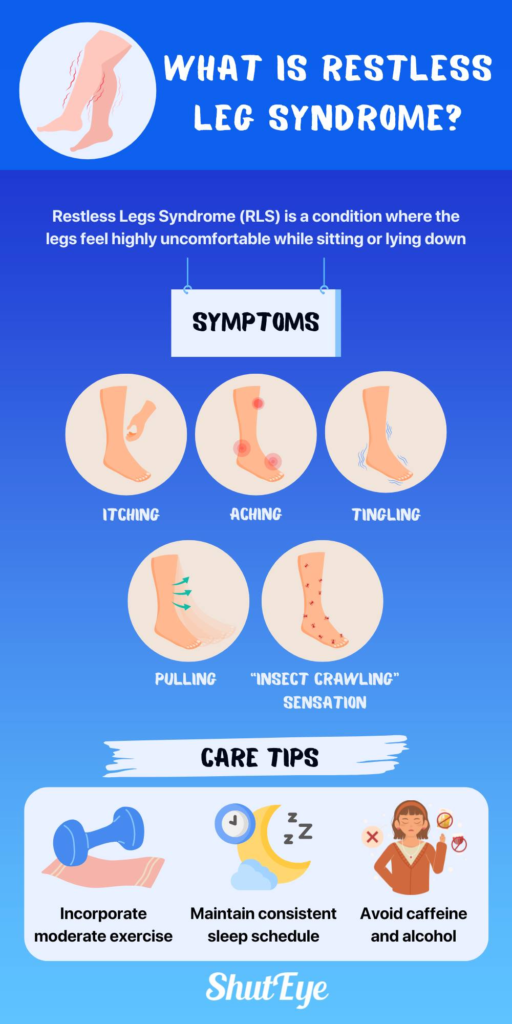


Did you know that between 10% and 34% of pregnant women develop restless leg syndrome, especially during the third trimester [1]? For some individuals, these symptoms can even persist postpartum.
Restless legs syndrome, also called RLS, can be a cause of great discomfort. Luckily, knowing what the triggers are for this condition and how to provide relief accordingly can certainly make RLS symptoms easier to manage.

RLS, also called Willis-Ekbom disease (WED/RLS), is a condition known for the overwhelming urge to move one’s legs, together with a feeling of discomfort [2]. RLS is often worse in the evening and is also often associated with periodic limb movements which are leg twitching and kicking during the night. That being said, RLS can also present itself when you are lying down, even during the day.
Restless legs syndrome and pregnancy often go hand in hand, and hormonal changes could even worsen symptoms in the third trimester especially.
Together with the urgent need to move one’s legs, RLS in pregnancy often presents itself as a painful, throbbing, or pulling feeling. The compelling need to move legs can be overwhelming, causing sleep disorders or difficulty sleeping due to involuntary movements. It is not the same as nocturnal leg cramps which can not be easily relieved or improved by moving the legs.
It goes without saying that an expecting mother needs optimal sleep during every trimester, with the average sleep duration lasting between seven and nine hours. However, a lack of sleep, due to developing RLS, or even other conditions, could severely impact a pregnant woman’s health.
These include an increased risk for adverse pregnancy outcomes such as preeclampsia and preterm birth, as well as other general afflictions such as fatigue, sleep disorders, and difficulty concentrating.

Although family history could be an indicator of the cause of RLS during pregnancy, other causes could include hormonal changes, such as those of estradiol and progesterone that rise significantly during the third trimester. A dopamine imbalance [3], an iron deficiency, and other mineral shortfalls can also be reasons why restless legs syndrome peaks during pregnancy.

Magnesium and iron are key supplements that can assist with alleviating the woes that RLS could cause. Typically, pregnant women who are between 19 and 30 years old need a daily intake of 350 mg, and individuals who are 31 or older require 360 mg. You can also bring magnesium into your daily diet with leafy green, legumes, nuts, and seeds.
Iron supplements, and foods rich in iron, can also help reduce the symptoms of RLS. According to the Office of Dietary Supplements, a pregnant woman needs 27 mg of iron daily [4]. If you suspect that you might have iron deficiency anemia during pregnancy, you can check in with your doctor to determine if this is indeed the case and what your best course of action could be.
Always remember to consult your doctor before you add supplements to your diet while pregnant. In the case of magnesium, this supplement might interact negatively with other medicines.


Although RLS might be unavoidable in some cases, there are some lifestyle changes that you can take to help you manage symptoms. One way, for instance, is to take a relaxing warm bath, which can help facilitate deep sleep and help you relax.
Also, keeping track of what you eat in a food journal can help you determine if any food triggers are causing RLS symptoms. This can serve as a guide to help you avoid certain triggers that could make symptoms worse.
See also: 10 Sleep Better Tips To Beat Insomnia
RLS might be unavoidable; however, lifestyle changes can significantly ease women’s discomfort due to RLS in pregnancy. If you have any concerns about restless legs syndrome during pregnancy, it is best to make an appointment with your doctor to ensure you do not have underlying medical conditions that are making RLS worse.
For more tips to help you fall asleep faster, try out the ShutEye® app. ShutEye® is a patented sleep-tracking app that monitors your sleep cycle and offers personalized tips to help you improve your sleep quality.
Cannon S, Hayman M, Lastella M. Pregnant Women's Attitudes and Beliefs towards Sleep and Exercise: A Cross-Sectional Survey. Clocks Sleep. 2023 Jan 17;5(1):34-44. doi: 10.3390/clockssleep5010004. PMID: 36810841; PMCID: PMC9944079.
Gupta R, Dhyani M, Kendzerska T, Pandi-Perumal SR, BaHammam AS, Srivanitchapoom P, Pandey S, Hallett M. Restless legs syndrome and pregnancy: prevalence, possible pathophysiological mechanisms and treatment. Acta Neurol Scand. 2016 May;133(5):320-9. doi: 10.1111/ane.12520. Epub 2015 Oct 19. PMID: 26482928; PMCID: PMC5562408.
Masters, M. (2022) Restless Legs Syndrome (RLS) During Pregnancy [online]. Available at: https://www.whattoexpect.com/pregnancy/symptoms-and-solutions/restless-leg.aspx
Mayo Clinic (2024) Restless legs syndrome [Online]. Available at: https://www.mayoclinic.org/diseases-conditions/restless-legs-syndrome/symptoms-causes/syc-20377168
Office of Dietary Supplements (2023) Iron [online]. Available at: https://ods.od.nih.gov/factsheets/Iron-Consumer/
Pietrangelo, A. (2017) Pregnancy Problems: Restless Leg Syndrome [Online] Available at: https://www.healthline.com/health/pregnancy-problems-restless-leg-syndrome